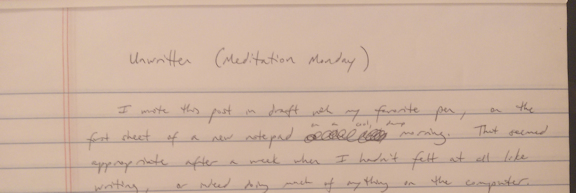I wrote this post in draft with my favorite pen, on the first sheet of a new notepad on a cool, damp morning. That seemed appropriate after a week when I hadn’t felt at all like writing, or indeed doing much of anything on the computer.
Instead of trying to force the muse to get busy when she was nowhere to be found, I decided to reflect quietly on what benefits, if any, there might be in days without writing. At first the very idea that there might be something positive going on seemed a bit of a stretch; it was hard to wrap my mind around it. After all, in our culture, anyone who is audacious enough to claim the identity of “writer” is expected to scribble away daily and produce enough material to be worthy. Bursts of inspiration should appear regularly; and if not, we must go forth on a brave quest to slay the evil dragon of writer’s block.
The underlying fear seems to be that if a day goes by without feeling motivated to do any writing, many more will follow, and soon the dragon will be found gleefully gnawing on the poor failed writer’s bones. That’s a silly fear, of course—for those of us who process our experiences mainly through written words, putting down our words on paper (or the computer) is as natural as breathing. Sometimes we may get so busy with other things that we lack sufficient processing capacity, but it always gets freed up after a while.
Coming back around to my original question, then, a day without writing would be a day when the subconscious mind requires more mental CPU space to process other things; and the benefits, in general, would consist of a better understanding of whatever else is being processed. So, after meditating on it for a while, I concluded that “writer’s block” is not really an evil dragon to be feared—it’s a perfectly normal response to the human need to make sense of our experiences, in one way or another.

